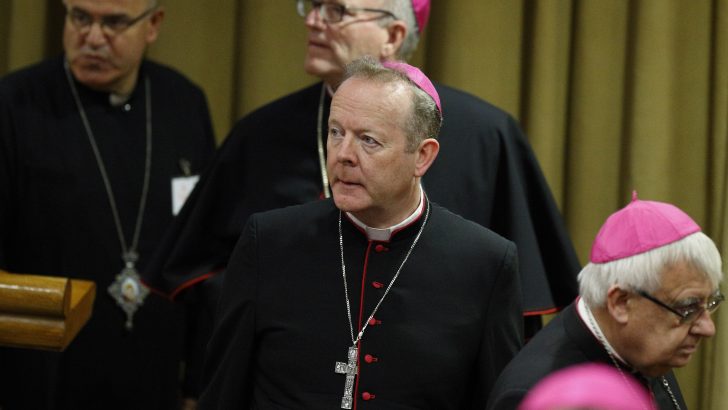Pope-emeritus Benedict XVI called for “urgent action” to address the crisis of abuse by clergy in the Church in Ireland, the Primate of All-Ireland has said.
His comments come following the news that the former pope died this morning.
Archbishop Eamon Martin said he was “saddened”, remembering his “gentle soul in prayer, asking God, in his great mercy, to forgive his sins and human failings, while rewarding his generous service and complete dedication to the Gospel and to the Church.
“On behalf of the Irish Bishops’ Conference, and the Faithful across Ireland, I extend sympathy to Pope Francis, to the family members and carers of the Pope Emeritus, and to all those in his native Germany and around the globe who loved him and will mourn his loss.”
The Primate of All-Ireland recalled Benedict’s “unique” Pastoral Letter to the Catholics of Ireland in 2010, at the height of the abuse crisis.
In it, the then pope expressed “profound sorrow for those grievously wounded by abuse in the Church”, said Archbishop Martin in a statement released today, Saturday.
He continued, saying: “The then pope called for urgent action to address the legacy of abuse which, he said, has had ‘such tragic consequences in the lives of victims and their families’, and which has ‘obscured the light of the Gospel to a degree that not even centuries of persecution succeeded in doing’.”
The archbishop of Armagh highlighted Pope Benedict XVI’s interest in Ireland, which “goes back to his friendship with the late Archbishop Kevin McNamara of Dublin when both were young theology professors”.
“Former students of the Pontifical Irish College, Rome, also remember fondly his visit there as cardinal,” Archbishop Martin said.
“He often admired the huge contribution of generations of Irish men and women to the Church, and to humanity, and he took a special interest in the work of early Celtic missionaries like St Columbanus to the spread the Gospel in Europe and to Europe’s spiritual identity.
“He followed closely, and prayerfully, the peace process as it matured.
“Although unable to travel to Ireland for the 50th International Eucharistic Congress in 2012, he delivered the key televised address to participating pilgrims.
“His message then, about the Church as communion, recalled his remarkable 2007 Apostolic Exhortation Sacramentum Caritatis in which he speaks of the Holy Eucharist as a mystery to be simultaneously believed, celebrated and lived.”
Dr Martin described the deceased pope as “a person of deep spirituality and prayer, an outstanding apostle of Christ”, with a “great capacity to listen combined with a personal, discreet charm”.
“I remembered his commitment to service when I wrote in early January 2013 to accept my appointment by him as Coadjutor Archbishop of Armagh, just one month before he humbly resigned the papacy due to failing health.”
Pope Benedict understood the “need and potential for all people of goodwill to work for the realisation of the common good”, Dr Martin continued.
He praised Benedict’s emphasis on social issues, particularly on charity being “rooted in truth in order to be fruitful”.
“On the eve of his election to the Petrine Ministry, the then Cardinal Ratzinger incisively identified a tendency in society to lapse into ‘a dictatorship of relativism.’
“At the same time, his papacy was marked by a commitment to dialogue between faith and reason, between the Church and the modern world, and to ecumenical and interreligious dialogue, as evidenced on his significant apostolic journey to the United Kingdom in 2010.”
An “outstanding teacher and academic”, the pope emeritus “always ensured that the faith was not reduced to academic hair splitting”.
“Religion, he emphasised, is not a lofty concept or an ethical ideal; it is rather, an encounter with a person, Jesus Christ.
“His personal writings on Jesus of Nazareth bear witness to his life’s work to share the Good News of salvation that comes through Christ.
“In many respects he was similar to the early Bishops and Doctors of the Church, combining great clarity of doctrine with pastoral realism.”
Archbishop Martin finished by praying that, with the help of God’s mercy,
“the saints will go out to meet him and welcome him into his heavenly home”.


 Ruadhán Jones
Ruadhán Jones Primate of All-Ireland Archbishop Eamon Martin. Photo: CNS
Primate of All-Ireland Archbishop Eamon Martin. Photo: CNS 